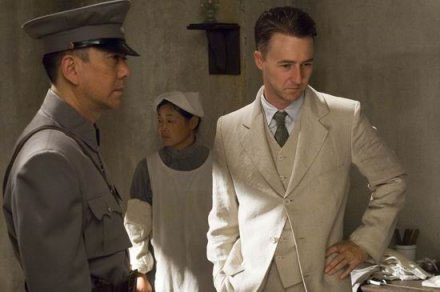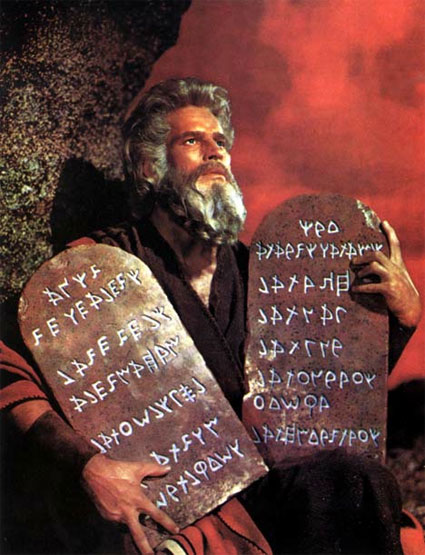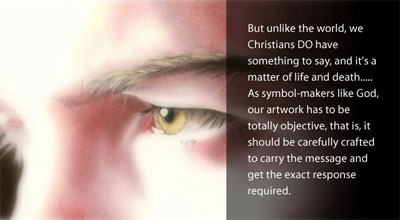Apr
15
2009
[from Auburn Avenue blog]
The Christian imagination
Each semester at the Bucer Institute we have a course we call “The Church and Culture” which is basically a catch-all for any topic we’d like to talk about. Our “Church and Culture” class for this semester was held this past Saturday on the topic of “The Christian Imagination” and it was outstanding. (Check out the MP3s when they are ready for downloading, you won’t regret it.).
Too many good things were said to repeat them all, but here are a few of them:
- A woman living on the frontier in the 19th century commented on the quilts she made: “I make them warm to keep my family from freezing; I make them beautiful to keep my heart from breaking.”
- Poetry humbles us by giving us more than we can understand. It’s “bigger” than we are.
- Why are the Reformed so unimaginative? Artists tend to arise from traditions that allow mystery, not from traditions that see mystery as a threat to the “system” and therefore always seek to explain (or define) it away.
- The literal is too skeletal and minimalistic to carry the grand load of truth that the poetic can easily transport.
Some of the things covered were: the importance of the imagination; the imagination and theology; how to cultivate a sanctified imagination; a primer on poetry; and the deeper meaning of watching the dead bodies of plague victims being catapulted over the walls of a besieged city. All in all, it was more fun than ought to be legal.
Comments Off | tags: Auburn Avenue, Bucer Institute, Culture, Poetry | posted in Biblical Theology, Christian Life, Quotes
Apr
10
2009
In his lectures on worship, James Jordan comments:
The church is the first form of the kingdom. The church is also the nursery of the kingdom. It’s within the institutional church that the fundamental principles of the kingdom are taught and learned. Christians learn government through the church government of elders. Having learned that, Christians are then ready to govern in more broad circumstances. We learn finances in the church, through the administration of the tithe. We learn charity in the church because we are starving and God feeds us bread and wine.
We learn music in the church. All of western music flows out of the music of the church. All of western theatre flows out of the liturgy of the church. All of western literature flows out of the literature of the church.
The church creates civilisation. The church is the nursery of culture.1
Western culture, then, is at the stage of Solomon with his idolatrous wives. The church is now just mimicking the corrupted culture of the world instead of being the pioneer. And we know what happened to Solomon’s kingdom.
1 Ten Principles of Worship, Lecture 1. Available from www.wordmp3.com
Comments Off | tags: Compromise, Culture, Ecclesiology, James Jordan, Music, Solomon, Wisdom | posted in Biblical Theology
Apr
10
2009

Just watched The Painted Veil. Must be Edward Norton week. A movie based on a 1925 novel by Somerset Maugham, with strong messages of the benefit of forgiveness after betrayal, and of how suffering strips away our delusions and brings maturity and freedom to love.
The main thing that struck me was how the superstitions of the locals obstructed those who risked their lives to help them. We lose sight of just how much the gospel has changed the world, and take the foundation of our culture, the Bible, for granted.
Comments Off | tags: China, Culture, Film, Mission, Postmillennialism | posted in Christian Life
Apr
10
2009
The Mortification of Sin

Christ’s glory followed His victory in Gethsemane’s “Eden”.
When the Lord gave Adam the Law, He handed him a “scroll”—Adam’s mission. With clean hands and a pure heart, Adam could unseal and “look into it.” When the Lord returned, full of eyes, the scroll was open for blessing or cursing depending on Adam’s obedience. It was not the Lord who judged Adam, but the Lord’s words,unsealed at his “ascension” to headship over Eve, that judged him at the last day (of the week).
“If anyone hears my words and does not keep them, I do not judge him; for I did not come to judge the world but to save the world. The one who rejects me and does not receive my words has a judge; the word that I have spoken will judge him on the last day.” (John 12:47-48)
An open scroll brings testing. Adam’s disobedience opened his two eyes to his nakedness (Genesis 3:7), and the death of Passover (substitutionary animals). It opened his works to seven eyes of judgment—a cup of curses. Jesus’ obedience under testing brought Him glorification, the seven open eyes of the covered High Priest – the slain Lamb. Either we judge, or we are judged.
As Solomon, we put our “enemies” (sins) to judicial death (good death) as we mortify them (Romans 8:13; Colossians 3:5).
See also: Three Resurrections – 3: The Mission
[Solomon illustration from Barry Moser's illustrated King James Bible. Notice the round "firmament" over his head. Solomon sat enthroned between heaven and earth.]
Comments Off | tags: Culture, Justice, Solomon, Wisdom | posted in Biblical Theology
Apr
10
2009
Sacramental Doses of Death
Water, fire, salt and wine are symbols of judgment. In small quantities they bring life and keep death at bay (defilement). In large quantities, God uses them to destroy an irredeemable culture:
Syncretised sons of God (Gen 6) – water
Sodom – fire and salt (Gen 18-19)
The old Canaanite world, then Babylon – wine (Jer 25)
 For the church to be “salty” means it brings sound judgment to society. To lose its saltiness is the same as fire not being hot, or water not being cold. If we are not salty, we are lukewarm, and things that should be mortified in the church are not dealt with. Judgment begins at the house of God and flows to the nations.
For the church to be “salty” means it brings sound judgment to society. To lose its saltiness is the same as fire not being hot, or water not being cold. If we are not salty, we are lukewarm, and things that should be mortified in the church are not dealt with. Judgment begins at the house of God and flows to the nations.
In this context, the following words of James Jordan are not so shocking as they might otherwise appear:
The coming of the kingdom always involves the violent destruction of the wicked. When God announced the birth of Isaac, He immediately went out and destroyed Sodom (Genesis 18-19). These events are linked. The rescue of Israel from Egypt entailed the destruction of Egypt. The coming of the Spirit at Pentecost is followed by the slaying of Ananias and Sapphira. The New Covenant brought with it the horrors of AD70.1 Jesus is Kinsman Redeemer/Avenger. In Hebrew, redeem and avenge are the same word: ga’al.
Christians should rejoice at the privilege of bringing holy violence against the wicked and violating their plans and their wicked integrity. In union with Christ, who is both Redeemer and Avenger, Christians have both privileges. Serving in the Church, Christians extend redemption. Serving in the State, Christians extend Vengeance where necessary. The Christian serving as President of the USA should have Osama bin Laden captured and brought to Washington. Then, in front of television cameras from all nations of the world, the Christian President should smilingly blow bin Laden’s brains out, and publicly praise the Triune God for the privilege of doing so. Anyone who disagrees with this has no notion of what his baptism into union with Christ means.
A theology of indiscriminate “non-violence” is pure Satanism. It gives the world to the devil. In Christ we are now adults, and as adults we have grown-up responsibilities. One of those is the joyous privilege of exercising violence against the wicked.2
I have to say, I gulped hard when I first read this. But such a reaction shows how far out of step with Christ we are in our thinking. And such a judgment assumes we are already judging ourselves rightly with sacramental doses of water, fire, salt and wine and not hypocrites. The problem with the world begins with me.
_____________
1 Read Frederick Farrar’s summary here.
2 James B. Jordan, Evil Empire?, Biblical Horizons Newsletter No. 199, September 2008. Subscribe at www.biblicalhorizons.com
Comments Off | tags: AD70, Babylon, Communion, Compromise, Culture, Genesis, James Jordan, Justice, Wisdom | posted in Ethics
Apr
10
2009

Moses listened on the mountain as God spoke. He digested the law, and repeated it to the next generation in Deuteronomy, partly in a song that he taught them.
Moses’ tabernacle was silent. It was misused and dismembered, then reconstructed in the ‘next generation’ as the Tabernacle of David, with music and Gentile singers.
Continue reading
Comments Off | tags: Culture, Moses, Priesthood, Tabernacle, Temple | posted in Biblical Theology, Ethics
Apr
10
2009
Some good observations by Brian McLaren
Matthew Parris is a self-confessed atheist, but he writes with extraordinary candor and insight about the role of faith in social transformation in a recent Times article. He explains,
Now a confirmed atheist, I’ve become convinced of the enormous contribution that Christian evangelism makes in Africa: sharply distinct from the work of secular NGOs, government projects and international aid efforts. These alone will not do. Education and training alone will not do. In Africa Christianity changes people’s hearts. It brings a spiritual transformation. The rebirth is real. The change is good.
Continue reading
Comments Off | tags: Atheism, Culture, Hermeneutics, Mission | posted in Apologetics, Biblical Theology
Apr
10
2009
Steve Kryger, in his article Thank The Porn Industry?, says the sex trade has been the driving force behind innovation on the internet.
Clearly, not all of these innovations have been good (as the article itself concedes). It doesn’t take a particularly web-savvy reader to work out which of these are ‘naughty’ (in the words of the author), and which are ‘nice’:
• Online payment systems
• Spam
• Streaming content
• Malware
• Live chat
• Pop-ups, pop-unders and mousetrapping
• Broadband
• Browser hijacking
• Traffic optimisation
• Domain-name hijacking
• 3G mobile services
• Paris Hilton
Christian ministry makes use of six of these twelve innovations (i.e. all of the ‘nice’ ones!).
He complains about the fact that the world comes up with the ideas (like YouTube) and the church just mimics them (GodTube). I would agree on this when it comes to our worship music and culture. But in a very real sense, this is the way God has worked in history and will always work:
“Enoch and Babylon are the first cities, but Jerusalem is the last. Jubal is the first musician, but David the “last”. The wicked get there first and do much of the work, laying up an inheritance for the just. Because they are not concerned with morality, the wicked can employ slave labour to build their cultures early, while a righteous culture takes longer to build.”1
To clarify my thought, it means we as God’s people will inhabit houses, towns, vineyards and software that we didn’t build.
1 James B. Jordan, Was Job an Edomite King?, BIBLICAL Horizons, No. 131,www.biblicalhorizons.com
Comments Off | tags: Culture, James Jordan, Postmillennialism | posted in Biblical Theology, Ethics
Apr
10
2009
Peter Leithart comments on Ian McEwan’s remembrance of Updike: The Flight of the Spirit.
Comments Off | tags: Culture, Peter Leithart | posted in Quotes
Apr
10
2009

Whether you know it or not, as you flip through a magazine, or peruse a Christian bookstore, the big question on loop in your mind is “What’s in it for me?” In a culture where an advertiser or publisher has only seconds to grab your attention, there has to be a visual hook. Magazine articles hit us with one big photo, knowing that if they sell us with that, we’ll read the fine print. A book, right down to its spine, has to say “Pick me because…” For the world’s Vanity Fair hucksters, the aim is to wave a stunning flag at all costs. It doesn’t even have to be for the right country. Anything goes as long as they draw a crowd.
Continue reading
Comments Off | tags: Biblical worldview, Culture, Doug Jones, Protestantism | posted in Christian Life






























